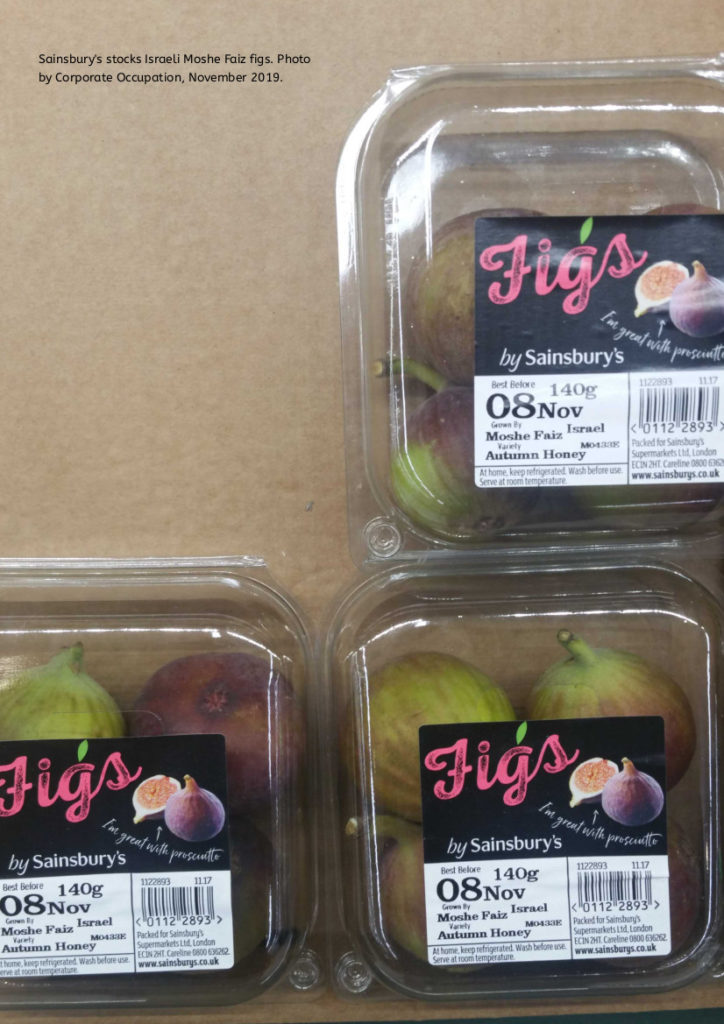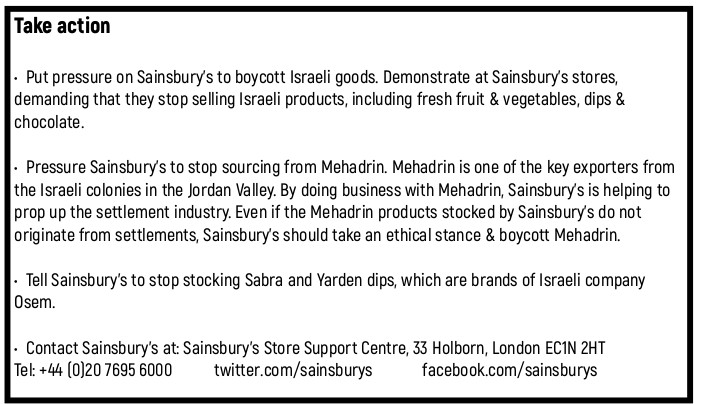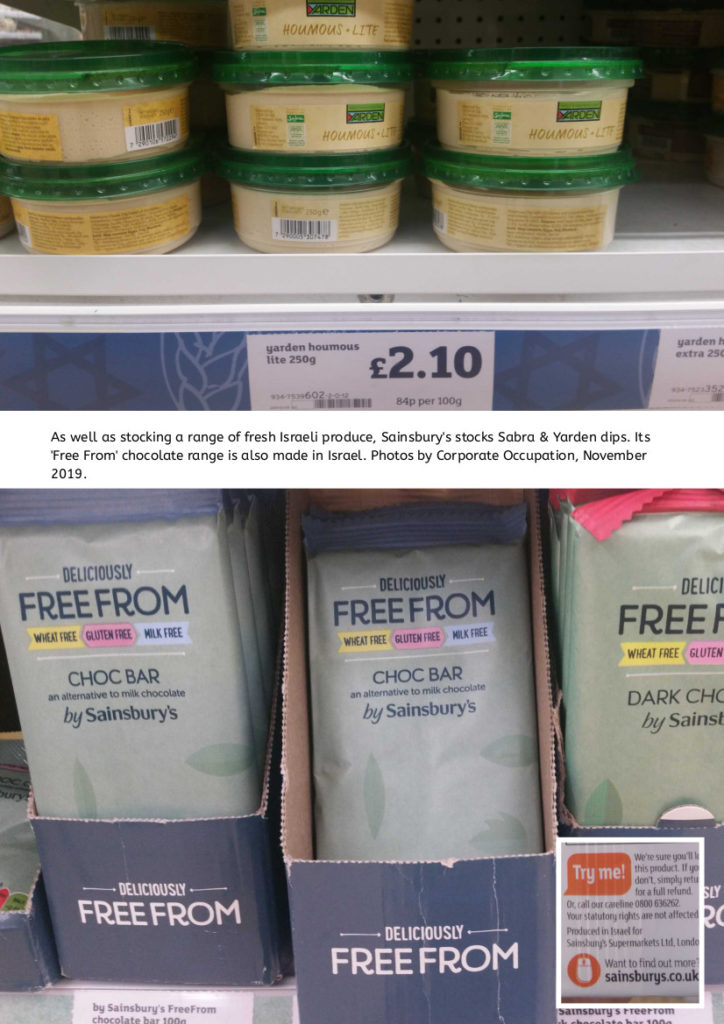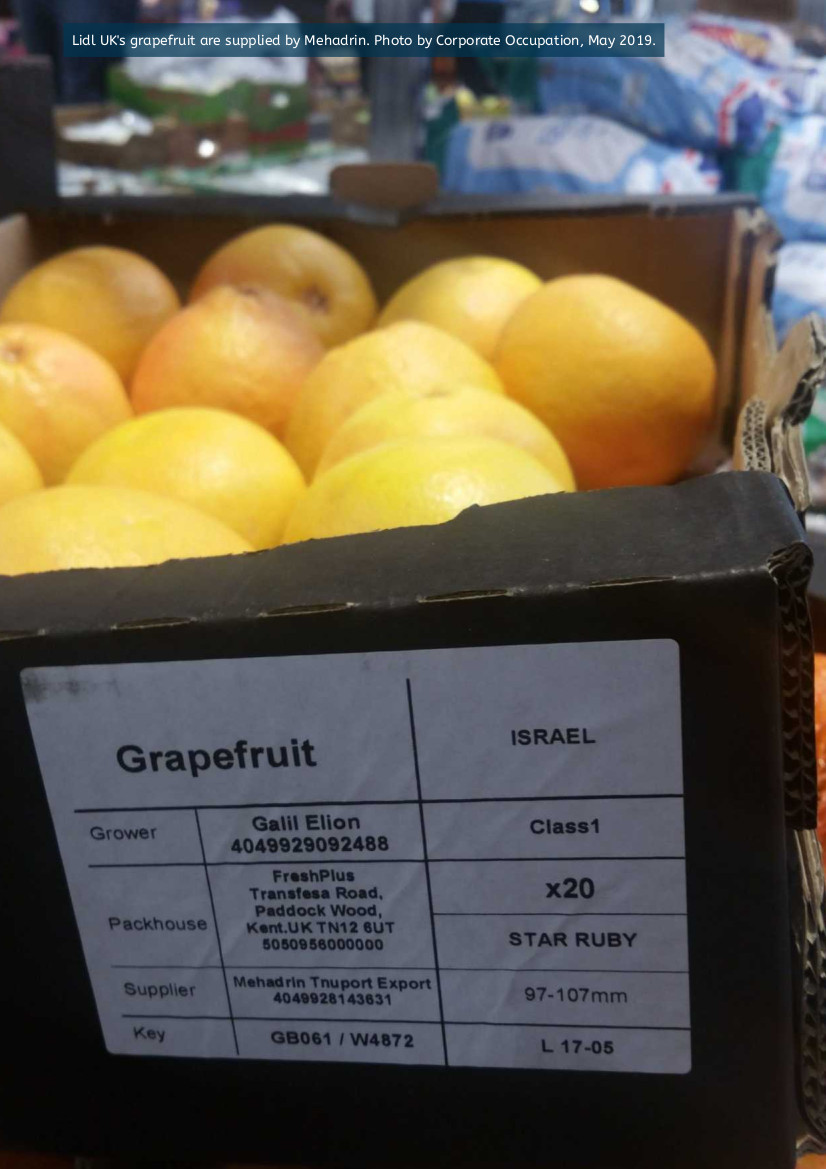Like its competitor Tesco, Sainsbury’s has previously sold produce that the supermarket knew was from illegal West Bank settlements. It continues to
stock produce from Mehadrin.
In 2008 activists took photographs of Sainsbury’s ‘SO Organic’ and ‘Taste the Difference’ Medjoul dates clearly labelled ‘Grown in West Bank’ inside the Jordan Valley settlements of Netiv Hagdud and Massua.
In 2016, ‘SO Organic’ Medjoul dates sold on the Sainsbury’s website were labelled as a ‘Product of either the US or Israel’ and, in light of the DEFRA guidelines on the labelling of produce from the West Bank, it would appear that the company has stopped sourcing these dates from West Bank settlements.[1]
However, its Israeli suppliers’ long history of mislabelling settlement produce means that even if Sainsbury’s has the intention not to source from the settlements, its suppliers may not be honest about the provenance of the produce they are supplying to the store.
Whilst it is not clear which company Sainsbury’s currently sources its Medjoul dates from, the supermarket has previously been linked with Israeli date-grower co-operative Hadiklaim. Hadiklaim is known for its mislabelling of settlement produce (see page 36).
In 2019 and early 2020, we photographed Sainsbury’s Hass avocados and grapefruit supplied by Israeli company Mehadrin. Mehadrin is one of the key exporters from Israel’s colonies in the Jordan Valley (see page 26). We also found Israeli figs in the fresh fruit section.
As of late 2019, Sainsbury’s advertises on its website that the following foods are either grown or packed in Israel: mangoes, potatoes, avocados, Jordan red grapefruit, pink grapefruit, persimmons (Sharon fruit), samphire, basil, thyme, sage, rosemary, dill, mint and chives.
The supermarket’s wide range of ‘Free From’ chocolate is also produced in Israel. Sainsbury’s also stocks houmous and other dips by Sabra and Yarden, both of which are brands of the Israeli Osem Group.[2]
Activists pressure Sainsbury’s
Corporate Occupation talked to activists from the ‘Taste the Indifference’ campaign, which focuses on Sainsbury’s. They told us about their experiences of pressuring the company:
“Sainsbury’s identifies itself as driven by values (‘Our Values Make Us Different’) and, as a result, it was the obvious target for a nationwide agricultural BDS campaign, seeking to build on the success achieved with the Co-op. The Co-op announced it would not source goods from the settlements some years ago and Sainsbury’s seemed to follow suit.
Add titleApartheid in the Fields: From Occupied Palestine to UK Supermarkets (2020 Update), Part 7.7: Sainsburys
Like its competitor Tesco, Sainsbury’s has previously sold produce that the supermarket knew was from illegal West Bank settlements. It continues to
stock produce from Mehadrin.
In 2008 activists took photographs of Sainsbury’s ‘SO Organic’ and ‘Taste the Difference’ Medjoul dates clearly labelled ‘Grown in West Bank’ inside the Jordan Valley settlements of Netiv Hagdud and Massua.
In 2016, ‘SO Organic’ Medjoul dates sold on the Sainsbury’s website were labelled as a ‘Product of either the US or Israel’ and, in light of the DEFRA guidelines on the labelling of produce from the West Bank, it would appear that the company has stopped sourcing these dates from West Bank settlements.[1]
However, its Israeli suppliers’ long history of mislabelling settlement produce means that even if Sainsbury’s has the intention not to source from the settlements, its suppliers may not be honest about the provenance of the produce they are supplying to the store.
Whilst it is not clear which company Sainsbury’s currently sources its Medjoul dates from, the supermarket has previously been linked with Israeli date-grower co-operative Hadiklaim. Hadiklaim is known for its mislabelling of settlement produce (see page 36).
In 2019 and early 2020, we photographed Sainsbury’s Hass avocados and grapefruit supplied by Israeli company Mehadrin. Mehadrin is one of the key exporters from Israel’s colonies in the Jordan Valley (see page 26). We also found Israeli figs in the fresh fruit section.
As of late 2019, Sainsbury’s advertises on its website that the following foods are either grown or packed in Israel: mangoes, potatoes, avocados, Jordan red grapefruit, pink grapefruit, persimmons (Sharon fruit), samphire, basil, thyme, sage, rosemary, dill, mint and chives.
The supermarket’s wide range of ‘Free From’ chocolate is also produced in Israel. Sainsbury’s also stocks houmous and other dips by Sabra and Yarden, both of which are brands of the Israeli Osem Group.[2]
Activists pressure Sainsbury’s
Corporate Occupation talked to activists from the ‘Taste the Indifference’ campaign, which focuses on Sainsbury’s. They told us about their experiences of pressuring the company:
“Sainsbury’s identifies itself as driven by values (‘Our Values Make Us Different’) and, as a result, it was the obvious target for a nationwide agricultural BDS campaign, seeking to build on the success achieved with the Co-op. The Co-op announced it would not source goods from the settlements some years ago and Sainsbury’s seemed to follow suit.
One customer activist, having found, bought and photographed some figs from a settlement, elicited an important admission from former CEO Justin King in September 2011:

‘Thank you very much for your email regarding the supply of figs from the Israeli Settlements. We do have a very clear policy and do not source from these settlements. Unfortunately, this was not picked up by our audit process due to a breakdown in communication with the supplier. The product was removed as soon as we were made aware and we have taken steps to ensure this does not happen again. Thank you again for bringing this matter to our attention and your ongoing communication with us on this issue.’
Nevertheless, a campaign to make Sainsbury’s follow the Co-op’s lead in also boycotting packers and distributors which profit from the occupation was not successful. After leafleting, extensive [supermarket] branch-focused activities, interventions and picketing, a strategic decision was taken to wind-down the campaign.
As things stand today, several years on, a quick survey of Sainsbury’s shelves suggests that there are fewer items on offer marked as produce of Israel than in most other big-name supermarkets, certainly in the realm of fresh fruit, vegetables and herbs.
Questions have continued to be asked at the AGM, especially since Sainsbury’s adopted a Human Rights Policy in 201 8. At the last AGM (201 9), two questions were asked relevant to this policy. One related to the Human Rights Watch report, ‘A Raw Deal: Abuses of Thai Workers in the Israeli Agricultural Sector’, which showed that agricultural workers within the state of Israel (now almost exclusively Thai) are subject to extremely abusive conditions and denied the most basic of their human rights and rights as workers – according to one commentator they were actually worked to death. (This work is backed up by a recent BBC investigation and a report by Fidh).[3]
The second question related to Israel’s recent legislation (The Nation State Basic Law and the defeat of the proposed Equality Basic Law). Both questioners identified the incompatibility of having a Human Rights Policy yet continuing to trade with a state where Human Rights are egregiously violated and where the legislation establishes, beyond doubt, the racist and apartheid nature of the state.”
The second question related to Israel’s recent legislation (The Nation State Basic Law and the defeat of the proposed Equality Basic Law). Both questioners identified the incompatibility of having a Human Rights Policy yet continuing to trade with a state where Human Rights are egregiously violated and where the legislation establishes, beyond doubt, the racist and apartheid nature of the state.”





0 Comments